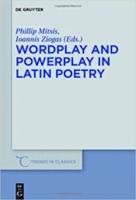
De Gruyter (2016) h/b 452pp £89.99 (ISBN 9783110472523)
In this volume of 21 papers arising from a conference in honour of Frederick Ahl (a ‘Fredschrift’ of course), all contributors start from ‘critical issues that have been at the centre of Frederick Ahl’s scholarship’ although there is no uniformity imposed—hardly surprising given the potential of wordplay to ‘destabilize the advertised certainties of authoritarian regimes’ and Ahl’s ‘study of wordplay not as a mere poetic ornament … but as fundamental to the politics of Latin poetry’. The volume has been restricted to Latin authors to achieve some ‘thematic coherence’. Virgil features most prominently, Ovid, Lucan, Statius and Seneca also receive more than one paper and Horace, Calpurnius Siculus and Silius Italicus are each represented by a single contribution. To discuss every paper would go well beyond this review’s allotted length, but a look at some of the detail from a few can offer a taste of the rich and varied contents.
The volume opens with Rhiannon Ash’s lucid discussion of poets in Tacitus. Her approach is not merely to examine how Tacitus represents named poets but (modestly) ‘to shed some light’ on poetry as a ‘decisive force (or not)’ for ‘socio-political change’. Tacitus may have written prose with a distinctly poetic flavor, but he includes poets and their performance in his narrative where they ‘intersect’ with those in power.
Ioannis Ziogas looks at legal language in Ovid, from the individual word (carmen as legal formula/pronouncement, OLD 1e) to the challenge of the Ars Amatoria and the story of Acontius and Cydippe. Cicero’s Pro Caelio and the Ars receive some attention and the comparison suggests a field for further research. Gregson Davis engages with the controversial issue of the killing of Turnus, finding a justification for Aeneas’ ira and symbolically taking ‘his place within the sanctified space of Mars Ultor.’ Peter Davis looks at free speech in Aeneid 11 and Metamorphoses 2-3 and detects a shift from public to private freedom, reflecting the change of political circumstances.
Not every paper is free from slips. Emily Gowers, on Dido/bubo and much more, warns readers ‘to put on a stout pair of wings and suspend themselves at all times over an ocean of disbelief.’ A caveat that could well apply to much of the book. When making a link between Dido and bubo she observes that the two are the only Latin nominative nouns to have a sequence ‘consonant-vowel-same consonantō’ (sic). When this sequence is sought in verbs, some join the list with no initial consonant (olo, oro and ovo). There is also a slightly misleading claim: ‘nine out of ten occurrences of Dido in Book 4 come at the end of a line (as with bubo).’ The statistic looks less convincing after a rough count yields nine out of fifteen. Dido she claims is always in the nominative (p. 111). This is to ignore the vocative in 408; and then, on (p.115) et nomine Dido / saepe vocaturum (383-4), it is ‘not nominative’, ‘possibly an accusative’ (see OLD and Austin ad loc.) but ‘more likely vocative.’ These are minor points of detail, for Dido is the only form used by Vergil, whatever the case may be.
Amor and mora anagrams for Roma are used effectively to explore the Aeneid by Jay Reed, but wordplay needs some control to prevent it becoming simply a word game. The discovery of another Publius Vergilius Maro ‘signature’ by Joshua Katz seems to take us to a back alley of scholarship instead of illuminating the highway. His discovery of the sequence Me VERo Primum at Georgics 2. 475 in a ‘very special’ context is preceded by other examples: PV…VE…MAR (Aen. 12. 587-8), MA…VE…PV (Georgics 1.429-433, a ‘skipped line acrostic’!) and P…VER…MA (Georgics 2.321-327). This example has vere (319)…ver…ver…vere, the last of which is followed by tument, and tum at the beginning of the next line, clearly referencing (!) Vertumnus, the god who can change into anything (cf. Ahl, Metaformations p. 316-7).
Alan Beale
